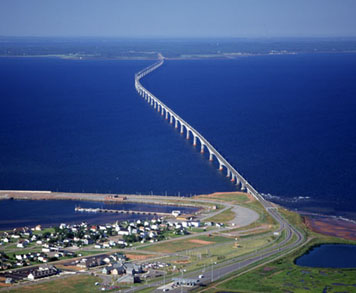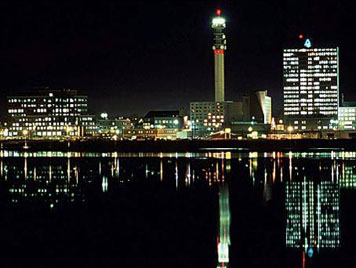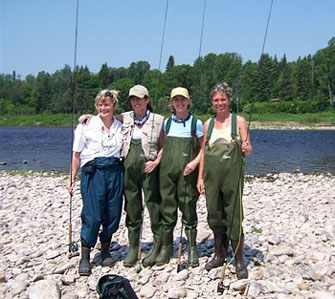Does New Brunswick election show anything at all beyond the Mighty Miramichi?
Sep 29th, 2010 | By Citizen X | Category: Canadian ProvincesIn this past Monday’s New Brunswick election, Shawn Graham’s incumbent Liberal government won a mere 13 of 55 seats in the provincial legislature, with 34% of the popular vote. David Alward’s Progressive Conservative opposition won a very comfortable new majority government, with 42 seats and 49% of the popular vote. (Neither the New Democrats, with 10% of the vote, or the Greens with 5%, managed to win any seats in the legislature at all.)
Canada-wide advocates of electoral reform or proportional representation have once again complained that this result “just completely twists the way politics works and … doesn’t reflect the voters …It’s reflecting the bizarre outcomes and allocations of power that the voting system is creating.” A system that allocated seats in the legislature strictly on the basis of the province-wide popular vote would have given Alward’s PCs only 27 seats (one shy of a bare majority), compared with 19 for the Liberals, 6 for the New Democrats, and 3 for the Green Party.
Talk of this sort does help put other talk about the “crushing defeat of the governing Liberals in this week’s New Brunswick election” into one kind of more balanced perspective. To interpret the election as some wholesale popular rejection of “liberal values” would clearly be wrong.
At the same time: “Voter turn-out increased over the last election: 71.4 per cent marked their ballots this time around compared to 67.5 per cent in 2006.” Compared with federal politics in Canada today, 49% of the popular vote for the winners versus only 34% for the main losers is democratically impressive enough. The way New Brunswick’s current first-past-the-post electoral system works, 42 seats is 14 more than a bare majority. And – barring some dramatic revolt of Progressive Conservative backbenchers – it does give Mr. Alward’s new government the practical political power to do pretty much as it pleases over the next four years.
Even so, just how much sense does it still make to link the New Brunswick results up with what seem to be much wider political trends, and urge with the Toronto Star, eg, that Shawn Graham’s defeat, “the first time since Confederation that a government in that province has failed to win a second consecutive mandate – is ringing alarm bells for incumbents in other provinces”?

The Confederation Bridge spans the Abegweit Passage of Northumberland Strait, linking Prince Edward Island with mainland New Brunswick. Construction began in the fall of 1993, and continued for three-and-a-half years at a cost of $1 billion. Nearly 13 km long, the bridge opened on 31 May 1997.
Is the Globe and Mail in Toronto onto something when it also urges: “Mr. Graham is the first elected New Brunswick Premier since Confederation to fail to secure re-election after his first term. If that province is ready to cast aside 150 years of political history, there’s a new political calculus at work across the land.”
The most obvious short answer is that nobody really knows right now. As the Globe and Mail itself allows, the extent to which a “new, conservative populism … may be out there,” reflecting new “‘Tea Party-lite’ tendencies in Canada … is, at this point, unclear.” Yet much commentary on the New Brunswick election from political quarters closer to home does suggest that it could be a big enough mistake to rush too quickly toward sounding any too big paranoid right-wing populist alarms in the most northern regions of North America.
According to the Chronicle Herald in Halifax: “More than anything, David Alward, New Brunswick’s Tory premier-designate, owes his lopsided election win to one declaration: ‘I will consult you’ … For all his passion to make New Brunswick financially stronger and a more attractive place to invest, Mr. Graham never grasped the importance of getting the public behind change.” He “lost on a solid record of failing to consult. And Mr. Alward will need impressive consulting skills to deal with a fiscal reality that doesn’t match his campaign promises. “

Kathy Jayson from Malabon City, Metro Manila, in the Philippines, is studying at Mount Allison University, in Sackville, New Brunswick, Canada – a place whose “size and personalized approach allows students to feel like individuals and not just numbers on campus.”
According to the Daily Gleaner in New Brunswick itself: “The message from Monday night’s election is that the people of New Brunswick don’t want premier-elect David Alward to make any bold and unexpected changes, says University of New Brunswick political scientist Don Desserud … ‘What the public, I think, is looking for is wisdom,’ he said … That means more than just consulting the public so it buys into a government idea … ‘No, the public wants – and it’s not fair, but this is the nature of the world – they want governments to make decisions and be leaders, but those decision[s have] to be the right decisions … You can’t bottle it. There is not a formula … You can’t go to school to figure out how to do that. You just have to get it right. When you don’t get it right, you pay a price.’”
And that, it seems, just may be the ultimate wisdom for this week from the mysterious east – for all parts of the home and native land and true north, strong and free, west of the Edmundston Airport on the Trans Canada Highway.




[…] This post was mentioned on Twitter by Counterweights , Martell Thornton. Martell Thornton said: Does New Brunswick election show anything at all beyond the Mighty …: At the same time: “Voter turn-out increase… http://bit.ly/bb1mSj […]
http://topsy.com/www.counterweights.ca/2010/09/does-new-brunswick-election-show-anything-at-all-beyond-the-mighty-miramichi/?utm_source=pingback&utm_campaign=L2
Sadly, all issues raised in the blurb above point to the same old limited hangouts.
The population is not seeking wisdom, they are wisdom.
The population (by and large) is the conscience needed to govern, the ‘government’ as it stands is the antithesis of said.
The issue is not the method of voting, but the subversion of the proper forms of government that all are forced to vote for today. The proper form was bereft of ‘party affiliation’ (strategy of tension) and the attendant voting skew and intra-party coercion that said brings to all government.
The population in Canada seeks no ‘leadership’ from mere politicians and bureaucrats. They wish to return to the point at which they were – in the truest sense – The Government, and the point in time when those in positions great and small were servants of the public weal, not masters of fiefdoms and treasury.
I agree John that the “population … are wisdom” — sort of, at any rate, or under the highest assumptions of our democratic system, in principle and so forth. But really, at what point were they “in the truest sense — The Government … when those in positions” etc? At what point in the real-world history of New Brunswick, eg? Are you actually talking about anything that has ever actually existed, anywhere? Or ever could exist? There are certainly a lot of things wrong with our democratic politics nowadays. But I think if we are going to fix them we have to be a lot more hard-headed and practical than this.